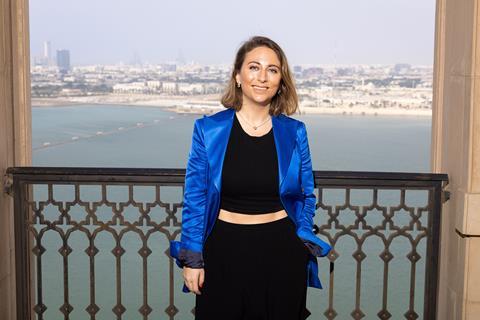
Warsha, a film about a crane operator who finds a sense of liberty dancing in the clouds, won the short film jury award – international fiction at the Sundance Film Festival earlier this year. With the film picking up more than 50 festival awards and qualifying for this year’s Oscars, the sky is the limit for Lebanese writer/director Dania Bdeir.
Born in Montreal in 1989 to Syrian parents, Bdeir grew up in Beirut thinking she wanted to be an actress. Realising that her future lay behind the camera, she received an MFA in filmmaking at New York University’s Tisch School of the Arts – but always knew that she wanted to write stories about the Arab world.
“I enjoyed my programme, the education, the exchange, and all these different cultures in the city, but I couldn’t write things from New York,” says Bdeir. “The need to make stories came from wanting to represent stories, characters and relationships that were never on screen. My stories were nearly always set in Beirut or about being an Arab away from home.”
The success of her work to date has proved those instincts were right. Her pre-thesis film Kaleidoscope (2014), about a young boy in Beirut, screened internationally and won awards including the Golden Palm at the 2014 Mexico International Film Festival. Her thesis film, In White (2016), about a girl travelling from New York to Beirut to attend her father’s funeral, received a grant from the Spike Lee Production Fund and won the international competition at the Rio de Janeiro International short film festival.
The idea for Warsha came during the summer of 2017, when she was writing on her Beirut balcony and saw a man standing on top of the drivers cab on a crane high above the city; on closer inspection, she realised that he was praying.
Inspired to write a story about a crane driver, Bdeir visited construction sites for research and was struck by three things: “It’s a masculine space; it’s loud; and the construction workers were often Syrian migrants. At that time, an artist called Khansa [a Lebanese belly dancer and musician] released his first music video, and I loved it. Later, we got talking, and suddenly we were brainstorming about this idea of a construction worker with him starring in it.”
Now living in Dubai, Bdeir is working on her debut feature Pigeon Wars. The story of a girl fighting patriarchy in Lebanon won a development prize at the Atlas Workshops in Marrakech, and is produced by Pierre Sarraf of Lebanon’s Né à Beyrouth Films (co-producer of Nadine Labaki’s Oscar-nominated Capernaum) and Sahar Yousefi of Canada’s Nava Projects.
With early support from Telefilm Canada, Bdeir and her producers are looking for financing partners on the $2m feature, which they hope to deliver by 2024.
Contact: daniabdeir@gmail.com

























No comments yet